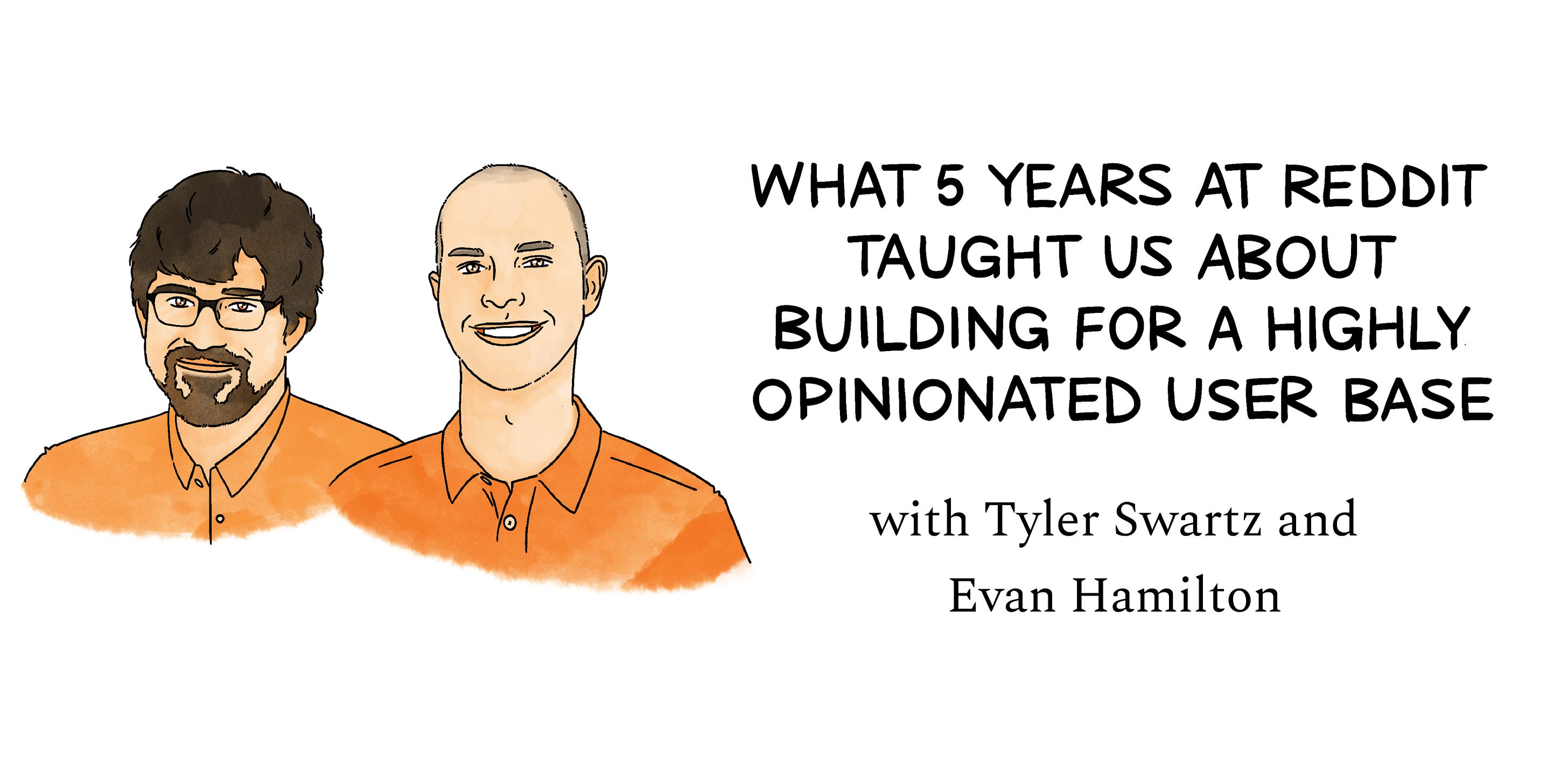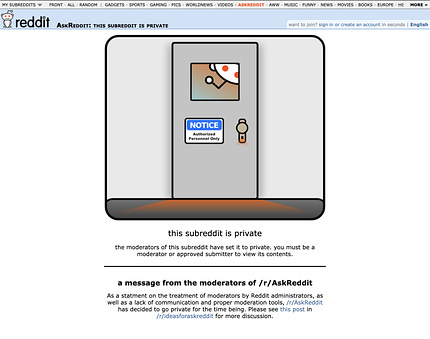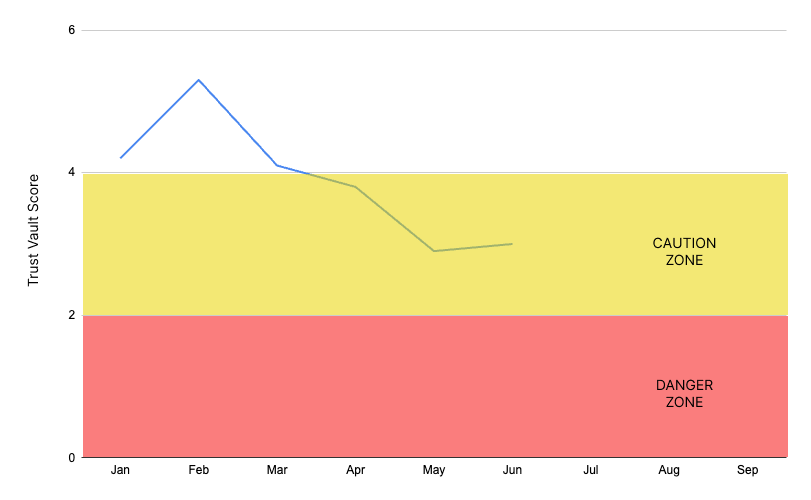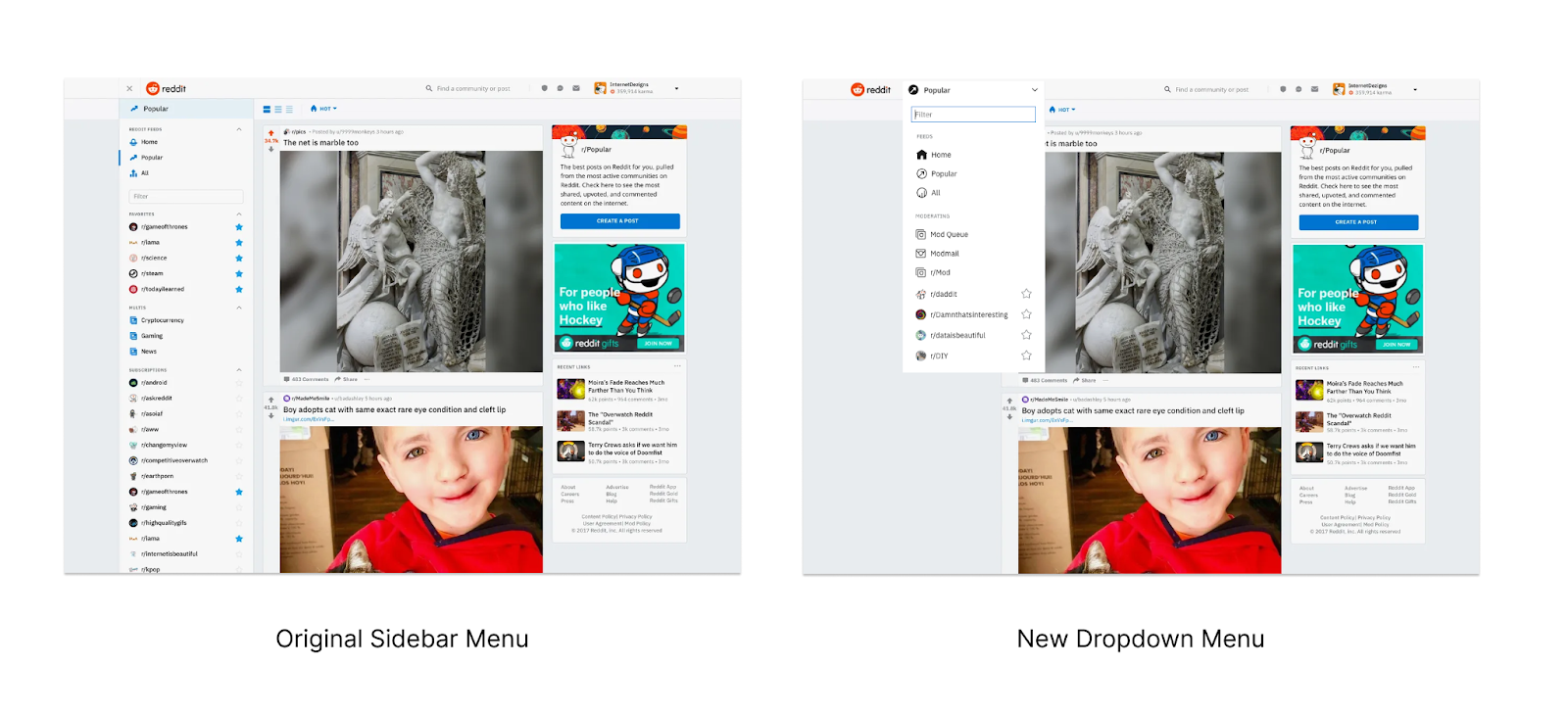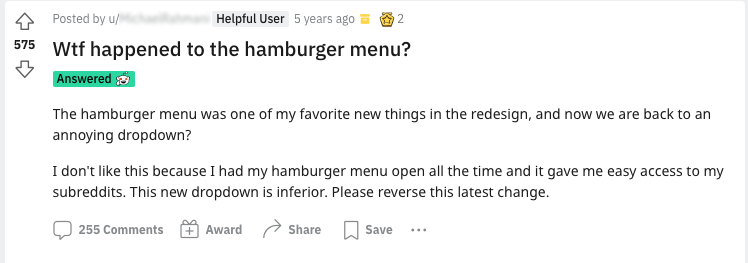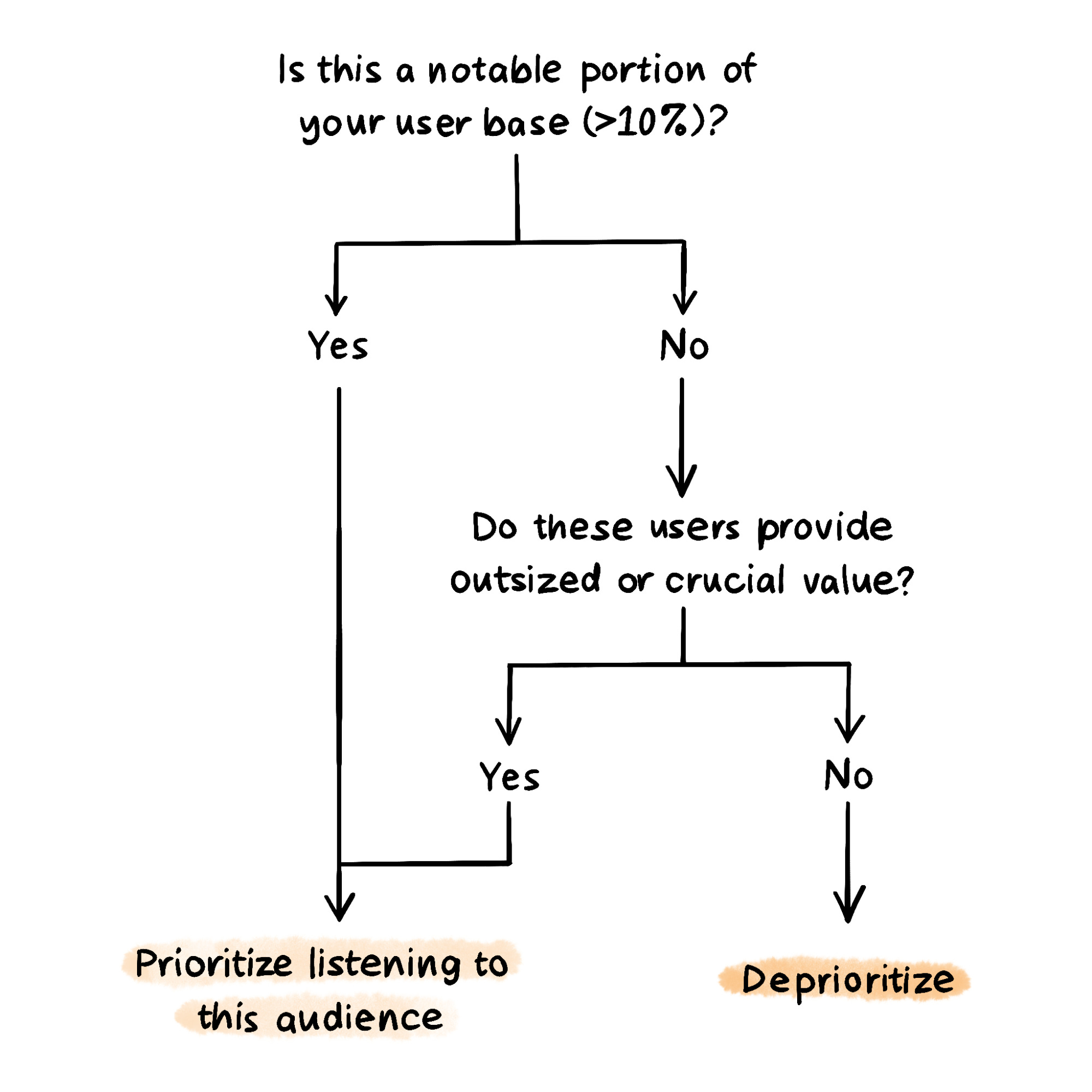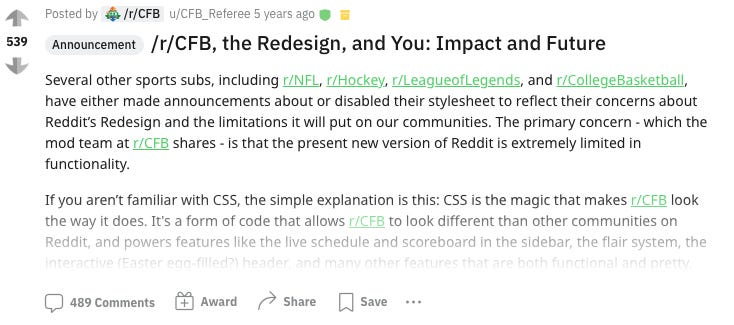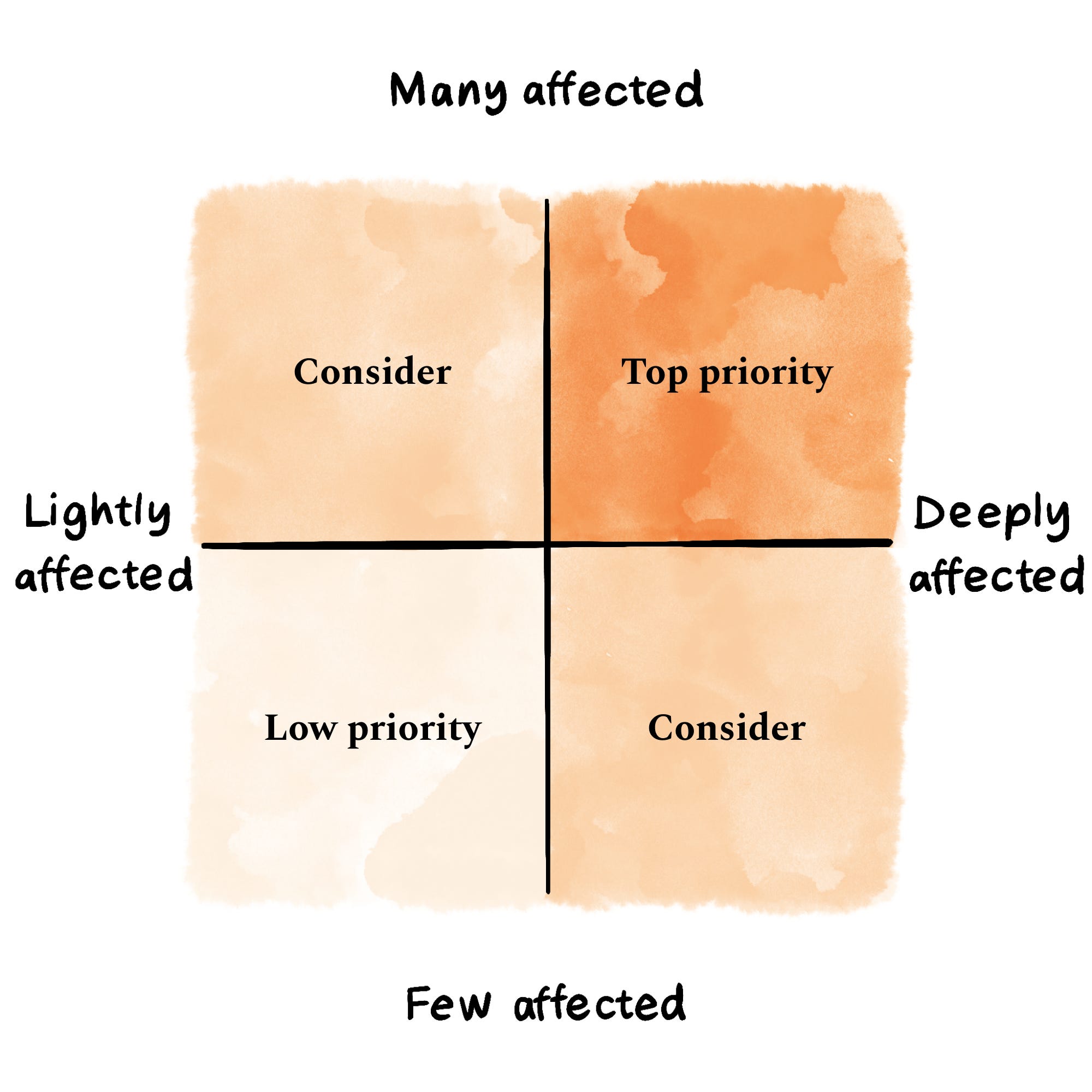What 5 years at Reddit taught us about building for a highly opinionated user base
Below is a peek at today’s paid subscriber-only post. Subscribe today and get access to this issue—and every issue. What 5 years at Reddit taught us about building for a highly opinionated user baseA framework, from the front lines of Reddit, for turning a sometimes combative relationship with users into a strong, productive partnership👋 Hey, I’m Lenny and welcome to a 🔒 subscriber-only edition 🔒 of my weekly newsletter. Each week I tackle reader questions about building product, driving growth, and accelerating your career. For this week’s guest series, I’m excited to bring you an incredible post by Evan Hamilton and Tyler Swartz, on a topic that is both timely and near and dear to my heart. While leading the Airbnb host team, I had to learn to deal with a highly vocal Airbnb host community while making constant changes to the product. Although Airbnb hosts aren’t as opinionated as Reddit users, their homes and livelihoods are on the line, so the stakes are high for them. I truly wish I’d had this guide then. Thank you, Evan and Tyler, for sharing your story. Evan Hamilton has been building community and customer experience teams for over 15 years at both consumer and B2B companies like HubSpot, UserVoice, and Reddit, where he was head of community. His happy place is creating win-win situations that lift up community members and drive business goals. Evan curates a newsletter, Community Manager Breakfast, which includes three links about community building, delivered hot and fresh to your inbox every Monday. Tyler Swartz has a decade of product management experience, leading teams to create software loved by customers. His strength lies in connecting product and community, honed at Reddit, where he led a variety of teams over five years, including the safety team and content creation team. He is now building his own businesses, offering his community-building expertise to companies, and writing a weekly AI newsletter, The AI Product Report, where he tests AI-powered products and curates the most interesting and innovative products launching each week. Be sure to subscribe to his newsletter. It was 2015, and nearly 200 million people were visiting Reddit.com each month. Nothing seemed to slow Reddit down—not even revenues so low that Reddit had to solicit users to purchase “Reddit Gold.” Then one day, everyone who landed on Reddit.com found hundreds of their favorite pages shut down: The moderators had gone on strike. Reddit had no idea what to do. In under a week, the CEO was ousted. Passionate customers are a double-edged sword. Founders and product leaders pray for product-market fit, strong word-of-mouth growth, and a supportive community. But founders often struggle when the community feels—and displays—intense, vocal ownership of the product. We both spent more than five years at Reddit, and through blood, sweat, and tears, we developed a framework that helped turn a sometimes combative relationship with users into a strong, productive partnership most of the time. At its best, when Reddit gets it right, it hits monthly visitor milestones. As we are seeing in the recent news, maintaining the right balance with a highly opinionated user base takes continuous work. In this post, we’ll take you through four steps for building product with a highly opinionated user base:
1. Identify and measure your Trust VaultAt Reddit, we often heard alarmed product managers compare our angry users to petulant children. “Stop yelling,” they’d say. “Just act like adults!” In fact, they were acting like adults—specifically, parents whose fervent unconditional love can turn to burning rage when their children are threatened. Your team sees a product. The users see their baby. This mismatch between the parental and the professional means you are starting from a place of mistrust. Many of your most passionate customers suspect you’ll never care about the product as much as they do. This led us to the concept we call the Trust Vault—a metaphor for how much trust the customer base has in you. Your Trust Vault can be filled and it can be depleted. At Reddit we had multiple Trust Vaults: a company-level Trust Vault as well as Trust Vaults for individual teams or product managers. Just as you can’t ask parents not to love their kids, you can’t ask passionate users not to love your product. Don’t try to destroy their passion. Instead, fill the Trust Vault and harness their passion productively. One way to measure your Trust Vault is using the Edelman Trust Barometer, a survey that measures people’s trust in governments and major corporations. The two key questions in your survey should be:
(Note: Plan your cadence of surveys carefully. While it’s useful to have a live view of how your trust is trending, oversending the survey can itself deplete trust! Once or twice a quarter is generally fine unless you’re dealing with rapid swings in trust.) The answers you get can help you plan and execute new product launches. If the trust score with a target audience is too low, you might decide to adjust your launch plans—perhaps even delay launching a potentially controversial product. For example, at Reddit, if a product threatened to increase the day-to-day effort of moderators (e.g. introducing a new content type such as livestreaming) and the trust score for moderators had been trending downward, we might adjust our launch schedule, and even delay the launch until we had gotten a few Mod Experience Oriented Wins (MEOWs) . . . yes, that’s a real acronym. We knew that a few MEOWs would boost moderator trust and make it much easier to release a more controversial feature. 2. Find the right customer voices to listen toJust because someone is loud doesn’t mean you should act on their complaints. You need to get good at identifying whom you should pay attention to. That starts with examining who is being loud. Often the loudest people don’t represent your general user base or your ideal customer profile. When Tyler first got to Reddit, he made the mistake of responding to the loudest voices, versus determining whether their complaints truly represented the majority of users. In one of his first roles, he was a product manager on Reddit’s big redesign—an overhaul of its desktop site, the first redesign of the Reddit UI in 13 years. To collect feedback from redditors on the new design, Tyler and his team used a special private subreddit for beta users. The plan was to use feedback from the beta community to iterate on the new design and then slowly roll out the design to all users once we felt it was in a good place. A couple months into beta testing, the team released some updates to the “hamburger” menu, which is how you opened a sidebar menu. Within days, some redditors complained that the sidebar was hard to navigate. Tyler and team decided to make changes based on the negative feedback and created a new dropdown navigation paradigm to replace the sidebar. We felt stoked! We were iterating, moving fast, listening to our users. But our smiles faded as soon as we released the new design. Beta users posted negative comments far exceeding the original complaints about the sidebar. They demanded we bring the sidebar back. Where were all these people a few weeks earlier?! This experience taught us a few important lessons. First, customers typically won’t go out of their way to tell you if a feature is useful or helps them do a task. They treat useful features like table stakes: they expect them, so they don’t think those features are worthy of comment. As a result, it can be hard to tell whether negative feedback represents the attitudes of most users. Second, when assessing user feedback, it’s important to consider two key factors: (1) whether the feedback represents a significant portion (10% or more) of your user base and (2) whether the users who are giving feedback can influence the opinions of other users. Examples of influential users at Reddit would include moderators of smaller women-focused communities, as the company aimed to expand its user base beyond the core demographic of young male gamers and programmers. Third, if you decide to deprioritize a group’s feedback, make sure you help them understand why. For example, you might have a small but passionate group of bakers streaming on your livestream platform; helping them understand that you are primarily serving gamers will feel hard at first but avoid a lot of pain later. Often these groups don’t realize that their ideas don’t represent the whole user base. They may assume that most users feel more or less the same way they do. In brief, feedback comes in many forms and is not always vocalized. It’s crucial to analyze the representation and influence of those giving the feedback, and provide clear reasoning behind the decisions you make to ensure you don’t deplete your user’s trust. 3. Take actual discussion out of the public squarePerhaps the biggest thing we learned at Reddit is that the public square is not the place to have a nuanced product discussion. The trick is to form an advisory council—a group of passionate community representatives with whom you can discuss and ideate in a safe, private space. A private advisory council enables you to make the right product decisions and to set yourself up for success when you communicate with the larger audience. When the council is well chosen, its members become your early warning system, your shepherds, and your evangelists. And notably, they shouldn’t be yelling. An incident with a large sports subreddit made us realize we needed to form an advisory council. We were making changes to how “post” and “user flair” functioned (think: little icons on your username and next to your post title). Moderators of multiple sports subreddits posted public complaints about what we were doing. The public back-and-forths didn’t promote any clarity or alignment, largely because the incentive in the public subreddit comment thread was to win the conversation. We took the discussion to a phone call. Both sides could then start seeing each other as human beings and focus on relevant details of the flair design without as much grandstanding. Yet the conversation was still derailed by a single moderator who dominated the call and spent most of the time berating the product manager and demanding that we roll back the entire project. Thankfully, another moderator from the call DM’d us later with constructive feedback and paths forward. That’s when it clicked: we needed to create a space that disincentivized winning and incentivized nuanced conversation, compromise, and collaboration. Shortly thereafter, we hosted the first Moderator Advisory Council call. Here are four essential components for creating a successful advisory council: 1. Assemble a representative groupThis group should represent a broad cross-section of your user base: casual users, more serious users, minority groups, etc. Look for critical thinkers and strong communicators who won’t simply agree with you and who won’t be immovably stubborn. Including influential users within your customer base can be immensely helpful when pitching changes to a larger group. You can find these people on social media, in comments sections, and on idea forums. When you send out customer surveys, include a follow-up question—for example, “Can we contact you again if we have follow-ups?” Recruit thoughtful respondents from these results. You should aim to have a group large enough to have at least 10 people show up to your monthly council calls, but not so many that members are fighting to get a word in. At Reddit, this meant a group of roughly 80 people on a rolling basis. 2. Create a space and culture for reasonable discussionJust because you have assembled a good group of people doesn’t mean they’re automatically going to behave. You need to build a culture in your council that rewards candid feedback and thoughtfulness. Create a code of conduct and enforce it consistently. Remind everyone why they’re there at the beginning of meetings and praise the desired behavior. Be sure to lead by example. Evan has a more in-depth post on the topic here. Where you host these conversations will probably have more to do with your bandwidth. Live conversations tend to have the most clarity, but depending on the volume of items you’re launching, you may want to consider a forum or chat room in addition. Whatever space you choose, set expectations about your engagement in the space, and hold up your end of the bargain. At Reddit we had a private subreddit for async conversations and hosted regular calls with council members. 3. Build process and cadence for connectingThe earlier and more often you can consult this group, the better. Not only will this ensure that you have relevant feedback, it’ll also fill the Trust Vault and signal that you are taking them seriously. Ideally you are meeting with your council at least once a month; be sure to accommodate multiple time zones if you have a global audience. Ultimately, the cadence will depend on how involved they want to be and how frequently you are shipping. At times, we were doing more than one call a week!
When conducting meetings, make sure to be clear about where you are in the development process so that they know what type of feedback will be most helpful to you and the team. For example:
4. Cycle them outTo keep your group fresh, avoid having an advisory council with a fixed membership. A fixed membership can invest too few people with too much power; it can also leave you vulnerable to decision-making blind spots, since the people on the council might not adequately reflect the viewpoints of the larger group they represent. Finally, it can create a culture that disincentivizes candid feedback because members of the council are comfortable with your staff. To overcome these problems, we suggest setting a 12-month tenure for most members and cycling them out at the end (with the option of one extension). Thank them for their service and maintain the relationship. 4. Listen, but actThe number one trap we see most companies fall into when they start an advisory program like this is that they fail to act on the feedback they receive. They see it as a checkbox to placate the crowd. Here’s the problem: if you ask someone to give you their precious time and feedback and then don’t act on it, you’re actually burning more trust than if you had never asked at all. So the golden rule of feedback is this: Ask for feedback only if you’ll consider it. Have a systemDeciding what feedback to act on would be a whole post in and of itself, but at a high level, the best thing you can do is create a framework for filtering what you hear. Some feedback is well-intentioned rubbish. But even if the feedback has some great ideas, you’ll never have the bandwidth to build on all of them, nor will all of them be mission-critical. You have to think about the number of people that something affects. But at a big company like Reddit, you can’t think only about that, because even 10% of the user base is a huge number of people. Instead, you have to think about the depth of an effect in addition to its breadth. The following 2x2 matrix can help you think through some of the options here. Intuitively, things in the upper-right quadrant—ones that have a deep effect on a massive group—are top priorities: you should almost certainly do them. The home feed at Reddit is obviously a crucial space frequented by a massive number of people: upper right. By contrast, things in the lower-left quadrant—ones that have a shallow effect on a small group—are probably a no. We got frequent requests from the most hardcore of power users for folders to better manage their bookmarks—a feature that hardly anybody used in the first place: bottom left. Then there are things in the upper-left and lower-right quadrants—ones that have a shallow effect on a large group, and ones that have a deep effect on a small group. The flair example earlier in this post was the quintessential Reddit tool that some subreddits, like r/stopdrinking, completely relied on and most never even used: bottom right. When it comes to these things, you should keep three considerations in mind. First, think of your Trust Vault. While they may not be mission-critical features or fixes, they will affect how the community overall feels about you, how much goodwill you have stored in your Trust Vault, and how much people are willing to contribute to your advisory council. Second, think of any larger organizational goals you have. You want to delight your existing customers, so maintaining your Trust Vault is essential. But you should also consider future potential customers—new audiences you want to attract. Third, your advisory council should play an important role in your decision-making—not a solo role, but an important one. Balance is key. Say noIt may seem scary, but part of building up the Trust Vault is being transparent with your audience, even when you have tough news to share. Explaining that you’re not acting on a piece of feedback—and, crucially, why you’re not—may be painful in the moment, but it will build long-term trust. Here’s an example of us saying no. In 2020, Tyler and the team launched multi-image gallery posts, a much-requested feature that opened up a lot of creativity on Reddit. However, building a new post type was a massive undertaking. We had to change many platforms and APIs to support gallery creation and consumption in feeds, as well as moderator tooling and internal safety systems. The team frequently met with the advisory council throughout the multi-quarter development process to get feedback at each stage. Many moderators expressed concern about whether or not we would support “Old Reddit”—a web platform that many moderators fell in love with during Reddit’s early days. Old Reddit’s usage is low compared with mobile apps and the desktop site, but the people who use it are some of Reddit’s most vocal users. Moderators insisted that having galleries on Old Reddit was imperative. The advisory council calls helped us understand the underlying reasons for their concerns. We broke those concerns into three categories:
Plotted on the 2x2 matrix, they looked like this:... Subscribe to Lenny's Newsletter to read the rest.Become a paying subscriber of Lenny's Newsletter to get access to this post and other subscriber-only content. A subscription gets you:
|
Older messages
Lessons from scaling Ramp | Sri Batchu (Ramp, Instacart, Opendoor)
Sunday, June 25, 2023
Listen now (77 min) | Brought to you by Attio—A powerful, flexible CRM for fast-growing startups | Coda—Meet the evolution of docs | Eppo—Run reliable, impactful experiments — Sri Batchu currently
How to create an exceptional coverage plan for your parental leave
Tuesday, June 20, 2023
A step-by-step guide, and plug-and-play template, for going on leave with peace of mind
Leveraging growth advisors, hiring well, mastering SEO, and honing your craft | Luc Levesque (Shopify, Meta, TripA…
Tuesday, June 20, 2023
Listen now (80 min) | Brought to you by Mixpanel—Product analytics that everyone can trust, use, and afford | Attio—A powerful, flexible CRM for fast-growing startups | Eppo—Run reliable, impactful
Building high-performing teams | Melissa Tan (Webflow, Dropbox, Canva)
Tuesday, June 20, 2023
Listen now (75 min) | Brought to you by AssemblyAI—Production-ready AI models to transcribe and understand speech | Mixpanel—Product analytics that everyone can trust, use, and afford | Eppo—Run
The unconventional Palantir principles that catalyzed a generation of startups
Tuesday, June 13, 2023
How the principles we learned at Palantir spawned nine unicorns and 100+ venture-backed companies
You Might Also Like
🚀 Ready to scale? Apply now for the TinySeed SaaS Accelerator
Friday, February 14, 2025
What could $120K+ in funding do for your business?
📂 How to find a technical cofounder
Friday, February 14, 2025
If you're a marketer looking to become a founder, this newsletter is for you. Starting a startup alone is hard. Very hard. Even as someone who learned to code, I still believe that the
AI Impact Curves
Friday, February 14, 2025
Tomasz Tunguz Venture Capitalist If you were forwarded this newsletter, and you'd like to receive it in the future, subscribe here. AI Impact Curves What is the impact of AI across different
15 Silicon Valley Startups Raised $302 Million - Week of February 10, 2025
Friday, February 14, 2025
💕 AI's Power Couple 💰 How Stablecoins Could Drive the Dollar 🚚 USPS Halts China Inbound Packages for 12 Hours 💲 No One Knows How to Price AI Tools 💰 Blackrock & G42 on Financing AI
The Rewrite and Hybrid Favoritism 🤫
Friday, February 14, 2025
Dogs, Yay. Humans, Nay͏ ͏ ͏ ͏ ͏ ͏ ͏ ͏ ͏ ͏ ͏ ͏ ͏ ͏ ͏ ͏ ͏ ͏ ͏ ͏ ͏ ͏ ͏ ͏ ͏ ͏ ͏ ͏ ͏ ͏ ͏ ͏ ͏ ͏ ͏ ͏ ͏ ͏ ͏ ͏ ͏ ͏ ͏ ͏ ͏ ͏ ͏ ͏ ͏ ͏ ͏ ͏ ͏ ͏ ͏ ͏ ͏ ͏ ͏ ͏
🦄 AI product creation marketplace
Friday, February 14, 2025
Arcade is an AI-powered platform and marketplace that lets you design and create custom products, like jewelry.
Crazy week
Friday, February 14, 2025
Crazy week. ͏ ͏ ͏ ͏ ͏ ͏ ͏ ͏ ͏ ͏ ͏ ͏ ͏ ͏ ͏ ͏ ͏ ͏ ͏ ͏ ͏ ͏ ͏ ͏ ͏ ͏ ͏ ͏ ͏ ͏ ͏ ͏ ͏ ͏ ͏ ͏ ͏ ͏ ͏ ͏ ͏ ͏ ͏ ͏ ͏ ͏ ͏ ͏ ͏ ͏ ͏ ͏ ͏ ͏ ͏ ͏ ͏ ͏ ͏ ͏ ͏ ͏ ͏ ͏ ͏ ͏ ͏ ͏ ͏ ͏ ͏ ͏ ͏ ͏ ͏ ͏ ͏ ͏ ͏ ͏ ͏ ͏ ͏ ͏ ͏ ͏ ͏ ͏ ͏ ͏ ͏ ͏ ͏ ͏ ͏
join me: 6 trends shaping the AI landscape in 2025
Friday, February 14, 2025
this is tomorrow Hi there, Isabelle here, Senior Editor & Analyst at CB Insights. Tomorrow, I'll be breaking down the biggest shifts in AI – from the M&A surge to the deals fueling the
Six Startups to Watch
Friday, February 14, 2025
AI wrappers, DNA sequencing, fintech super-apps, and more. ͏ ͏ ͏ ͏ ͏ ͏ ͏ ͏ ͏ ͏ ͏ ͏ ͏ ͏ ͏ ͏ ͏ ͏ ͏ ͏ ͏ ͏ ͏ ͏ ͏ ͏ ͏ ͏ ͏ ͏ ͏ ͏ ͏ ͏ ͏ ͏ ͏ ͏ ͏ ͏ ͏ ͏ ͏ ͏ ͏ ͏ ͏ ͏ ͏ ͏ ͏ ͏ ͏ ͏ ͏ ͏ ͏ ͏ ͏ ͏ ͏ ͏ ͏ ͏ ͏ ͏ ͏ ͏ ͏ ͏ ͏
How Will AI-Native Games Work? Well, Now We Know.
Friday, February 14, 2025
A Deep Dive Into Simcluster ͏ ͏ ͏ ͏ ͏ ͏ ͏ ͏ ͏ ͏ ͏ ͏ ͏ ͏ ͏ ͏ ͏ ͏ ͏ ͏ ͏ ͏ ͏ ͏ ͏ ͏ ͏ ͏ ͏ ͏ ͏ ͏ ͏ ͏ ͏ ͏ ͏ ͏ ͏ ͏ ͏ ͏ ͏ ͏ ͏ ͏ ͏ ͏ ͏ ͏ ͏ ͏ ͏ ͏ ͏ ͏ ͏ ͏ ͏ ͏ ͏ ͏ ͏ ͏ ͏ ͏ ͏ ͏ ͏ ͏ ͏ ͏ ͏ ͏ ͏ ͏ ͏ ͏ ͏ ͏ ͏ ͏ ͏ ͏ ͏ ͏ ͏

